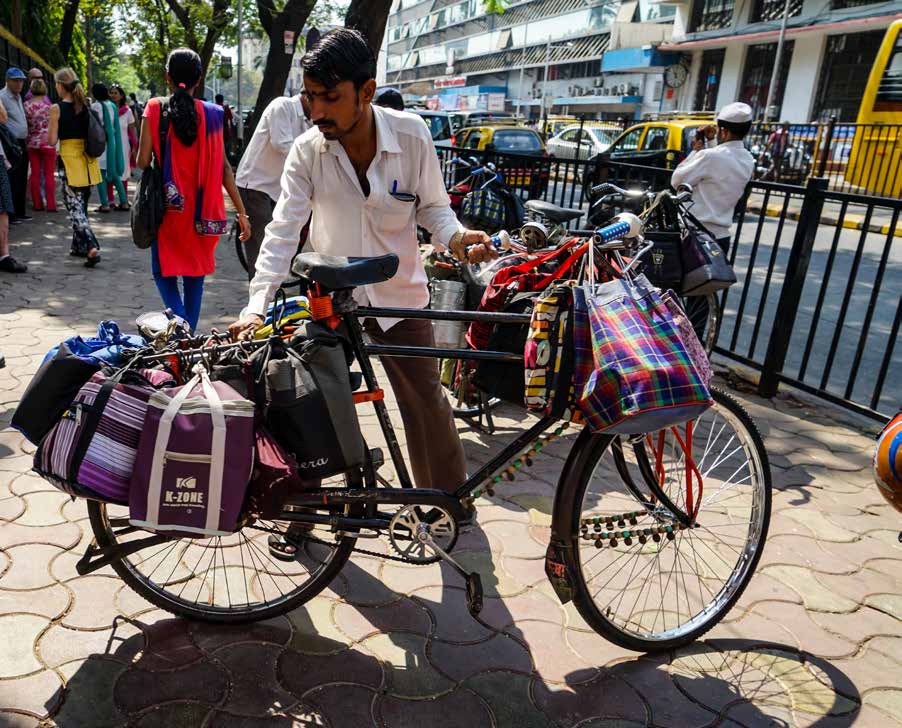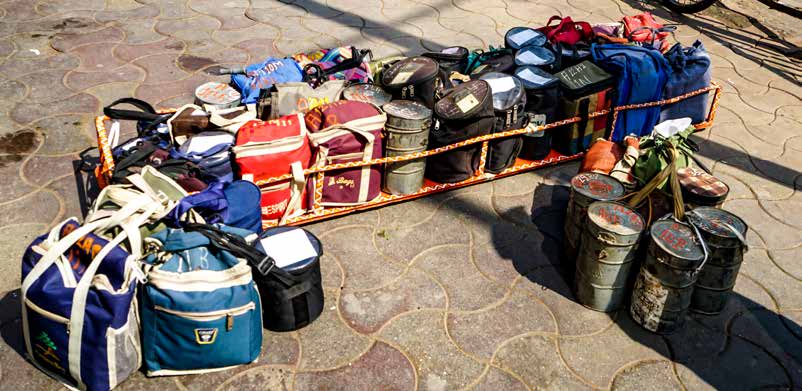Dabbawalla Dining Delivered
 While in Mumbai, I observed the process of the”Dabbawalla,” meaning “one who carries a box.”
While in Mumbai, I observed the process of the”Dabbawalla,” meaning “one who carries a box.”
Since the late 1800s, people prepared hot food for their families in their homes and place the lunch box outside their front door. Then the magic happens, it is picked up and later place on the expected person’s desk.
Ready for this, there are over two hundred and fifty thousand meals delivered daily. A network of people pickup the lunchboxes and deliver them to the train station for Mumbai.
It is fascinating to watch the rhythm of the men working, similar to a choreographed dance.
Once arriving in the city, lunchboxes are distributed and placed on bicycles to be hand-delivered. Amazingly, with almost one hundred percent accuracy, less than one mistake per six thousand deliveries. The lunch is carried in a “tiffin”, a multi-tiered metal cylinder box placed in a canvas bag.
There are no addresses or names on each bag. Four codes of colors and letters are used as identification. Rigorous and tight guidelines are demanded. The Dabbawalla is predominantly from one faction, the Varkari sect, and related to each other. It is a lifetime position that requires reliability and memory for correct distribution.
The group has an initiation fee equal to five months’ earnings but is a career for life. There are almost five thousand Dabbawalla members.
The Dabbawallas speak a unique language called Marathi. They are committed to their Hindu faith, the sect was formed by ancestral saints.
 India holds the Dabbawallas in high regard for their strict work ethics. Their lives are demanding because of the struggles of their work requires exceptional organization, memory, concise timing, and pride in success.
India holds the Dabbawallas in high regard for their strict work ethics. Their lives are demanding because of the struggles of their work requires exceptional organization, memory, concise timing, and pride in success.
Logistics sounds simple, but is it? Thousands of tiffin’s are picked-up around 8:30 am, delivered to offices between 11:30 am to 12:30 pm and returned to the original home by 2:30 pm.
The Dabbawallas wake up at 4:30 am, go to each home for pick-ups, transport by train to Mumbai and deliver by bicycle and return.
You quickly observe and understand why there is no one with any body fat.
Most lunches are made by the woman of the house for her working family. For widowers and single people, they can simply ask a Dabbawalla to start their service. Restaurants offer takeout lunches for pick-up also.
The cost of daily delivery is only about fifty cents per tiffin.
With sixteen million people living and working in Mumbai, imagine the congestion on trains. Crammed with thousands of people with these men carrying a metal delivery shelf on their heads, tensions can build.
Some of the loads may be as heavy as one hundred fifty pounds. Subsequently, after several squabbles with fellow passengers, the trains added two more cars exclusively for the Dabbawallas.
Delivery success has brought many companies to study their methods, including UPS and FEDEX. Just don’t get in their way, please!



Leave a Reply
Want to join the discussion?Feel free to contribute!